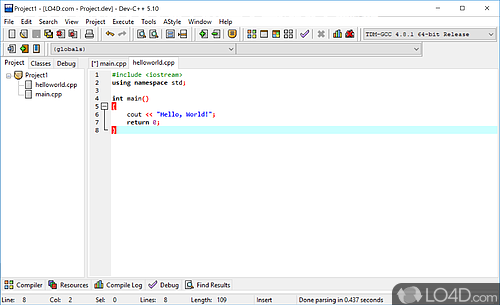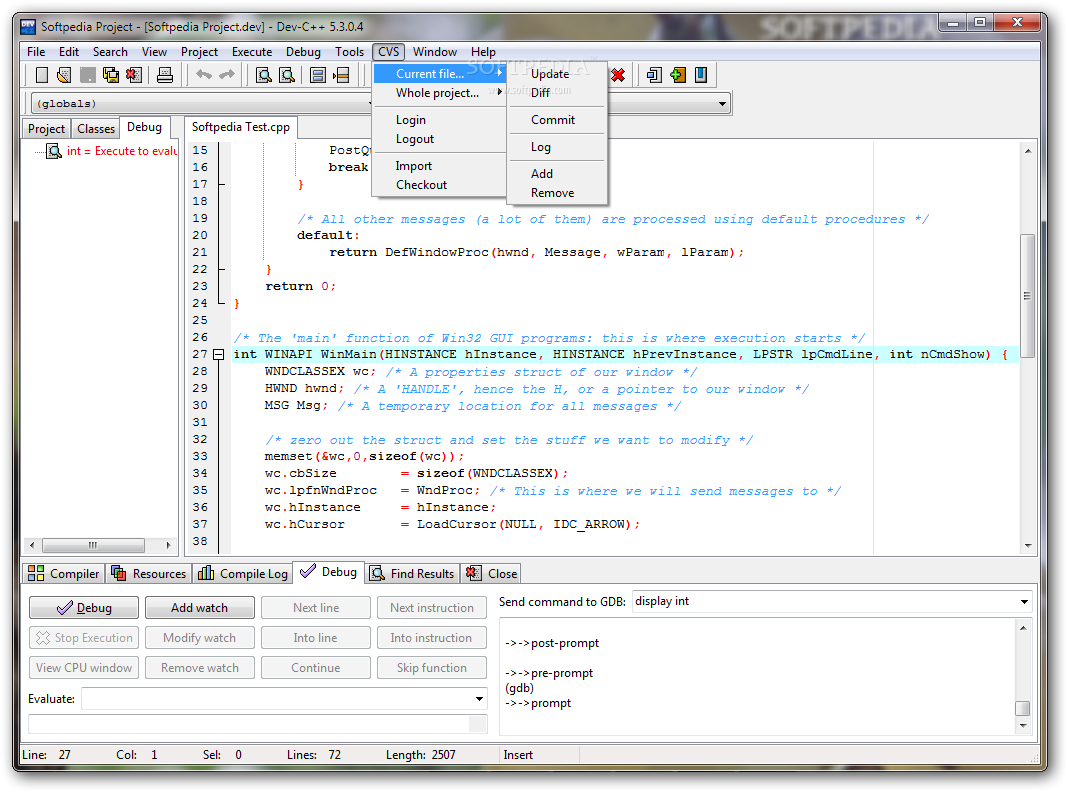How To Download Dev C++ For Linux
Linux projects are supported in Visual Studio 2017 and later.
- Downloading Header Files. Where can i download the following header files for dev c. In Linux, should be part of some package. No idea about Windows.
- Nov 29, 2016 Delphi is the ultimate IDE for creating cross-platform, natively compiled apps. Are you ready to design the best UIs of your life? Our award winning VCL framework for Windows and FireMonkey (FMX) visual framework for cross-platform UIs provide you with the foundation for intuitive, beautiful.
- May 18, 2016 g is a program that calls GCC and automatically specifies linking against the C library. It treats '.c ', '.h ' and '.i ' files as C source files instead of C source files unless -x is used.
- Apr 28, 2015 The DEV-C IDE also has the required compiling and debugging commands you would expect. Individual configurations for compiler, environment.
- Visual Studio setup. Type 'Visual Studio Installer' in the Windows search box: Look for the installer under the Apps results and double-click it. When the installer opens, choose Modify, and then click on the Workloads tab. Scroll down to Other toolsets and select the Linux development with C workload. If you are targeting IoT or embedded platforms, go to the Installation details pane on.
- Dev-C 4 Dev-C is a full-featured integrated development environment (IDE), which is able to create Windows or console-based C/C programs using the Mingw compiler system (version MSVCRT 2.95.2-1 included with this package), or the Cygwin compiler.
You can use the Visual Studio IDE on Windows to create, edit and debug C++ projects that execute on a remote Linux system, virtual machine, or the Windows Subsystem for Linux.
You can work on your existing code base that uses CMake without having to convert it to a Visual Studio project. If your code base is cross-platform, you can target both Windows and Linux from within Visual Studio. For example, you can edit, build, and debug your code on Windows using Visual Studio, then quickly retarget the project for Linux to build and debug in a Linux environment. Linux header files are automatically copied to your local machine, where Visual Studio uses them to provide full IntelliSense support (Statement Completion, Go to Definition, and so on).

Dev c ubuntu free download. Qmmp This program is an audio-player, written with the help of the Qt library. The user interface is simi.
For any of these scenarios, the Linux development with C++ workload is required.
Visual Studio setup
Type 'Visual Studio Installer' in the Windows search box:
Look for the installer under the Apps results and double-click it. When the installer opens, choose Modify, and then click on the Workloads tab. Scroll down to Other toolsets and select the Linux development with C++ workload.
If you are targeting IoT or embedded platforms, go to the Installation details pane on the right. Under Linux development with C++, expand Optional Components, and choose the components you need. CMake support for Linux is selected by default.
Click Modify to continue with the installation.
Options for creating a Linux environment
If you don't already have a Linux machine, you can create a Linux Virtual Machine on Azure. For more information, see Quickstart: Create a Linux virtual machine in the Azure portal.
On Windows 10, you can install and target your favorite Linux distro on the Windows Subsystem for Linux (WSL). For more information, see Windows Subsystem for Linux Installation Guide for Windows 10. If you're unable to access the Windows Store, you can manually download the WSL distro packages. WSL is a convenient console environment, but is not recommended for graphical applications.
Download Dev C++ For Linux Ubuntu
Linux projects in Visual Studio require the following dependencies to be installed on your remote Linux system or WSL:
- A compiler - Visual Studio 2019 has out-of-the-box support for GCC and Clang.
- gdb - Visual Studio automatically launches gdb on the Linux system, and uses the front-end of the Visual Studio debugger to provide a full-fidelity debugging experience on Linux.
- rsync and zip - the inclusion of rsync and zip allows Visual Studio to extract header files from your Linux system to the Windows filesystem for use by IntelliSense.
- make
- openssh-server (remote Linux systems only) - Visual Studio connects to remote Linux systems over a secure SSH connection.
- CMake (CMake projects only) - You can install Microsoft's statically linked CMake binaries for Linux.
- ninja-build (CMake projects only)- Ninja is the default generator for Linux and WSL configurations in Visual Studio 2019 version 16.6 or later.
The following commands assume you are using g++ instead of clang.
Linux projects in Visual Studio require the following dependencies to be installed on your remote Linux system or WSL:
- gcc - Visual Studio 2017 has out-of-the-box support for GCC.
- gdb - Visual Studio automatically launches gdb on the Linux system and uses the front-end of the Visual Studio debugger to provide a full-fidelity debugging experience on Linux.
- rsync and zip - the inclusion of rsync and zip allows Visual Studio to extract header files from your Linux system to the Windows filesystem to use for IntelliSense.
- make
- openssh-server - Visual Studio connects to remote Linux systems over a secure SSH connection.
- CMake (CMake projects only) - You can install Microsoft's statically linked CMake binaries for Linux.
Linux setup: Ubuntu on WSL
When you are targeting WSL, there is no need to add a remote connection or configure SSH in order to build and debug. zip and rsync are required for automatic syncing of Linux headers with Visual Studio for Intellisense support. If the required applications are not already present, you can install them as follows. ninja-build is only required for CMake projects.
Ubuntu on remote Linux systems
The target Linux system must have openssh-server, g++, gdb, ninja-build (CMake projects only), and make installed, and the ssh daemon must be running. zip and rsync are required for automatic syncing of remote headers with your local machine for Intellisense support. If these applications are not already present, you can install them as follows:
At a shell prompt on your Linux computer, run:
You may be prompted for your root password due to the sudo command. If so, enter it and continue. Once complete, the required services and tools are installed.
Ensure the ssh service is running on your Linux computer by running:
This starts the service and runs it in the background, ready to accept connections.
Fedora on WSL
Fedora uses the dnf package installer. To download g++, gdb, make, rsync, ninja-build, and zip, run:
zip and rsync are required for automatic syncing of Linux headers with Visual Studio for Intellisense support. ninja-build is only required for CMake projects.
Fedora on remote Linux systems
The target machine running Fedora uses the dnf package installer. To download openssh-server, g++, gdb, make, ninja-build, rsync, and zip, and restart the ssh daemon, follow these instructions. ninja-build is only required for CMake projects.
At a shell prompt on your Linux computer, run:
You may be prompted for your root password due to the sudo command. If so, enter it and continue. Once complete, the required services and tools are installed.
Ensure the ssh service is running on your Linux computer by running:
This starts the service and runs it in the background, ready to accept connections.
Support for Linux C++ development is available in Visual Studio 2017 and later.
Next Steps

Dev C++ For Linux Download
You are now ready to create or open a Linux project and configure it to run on the target system. For more information, see: